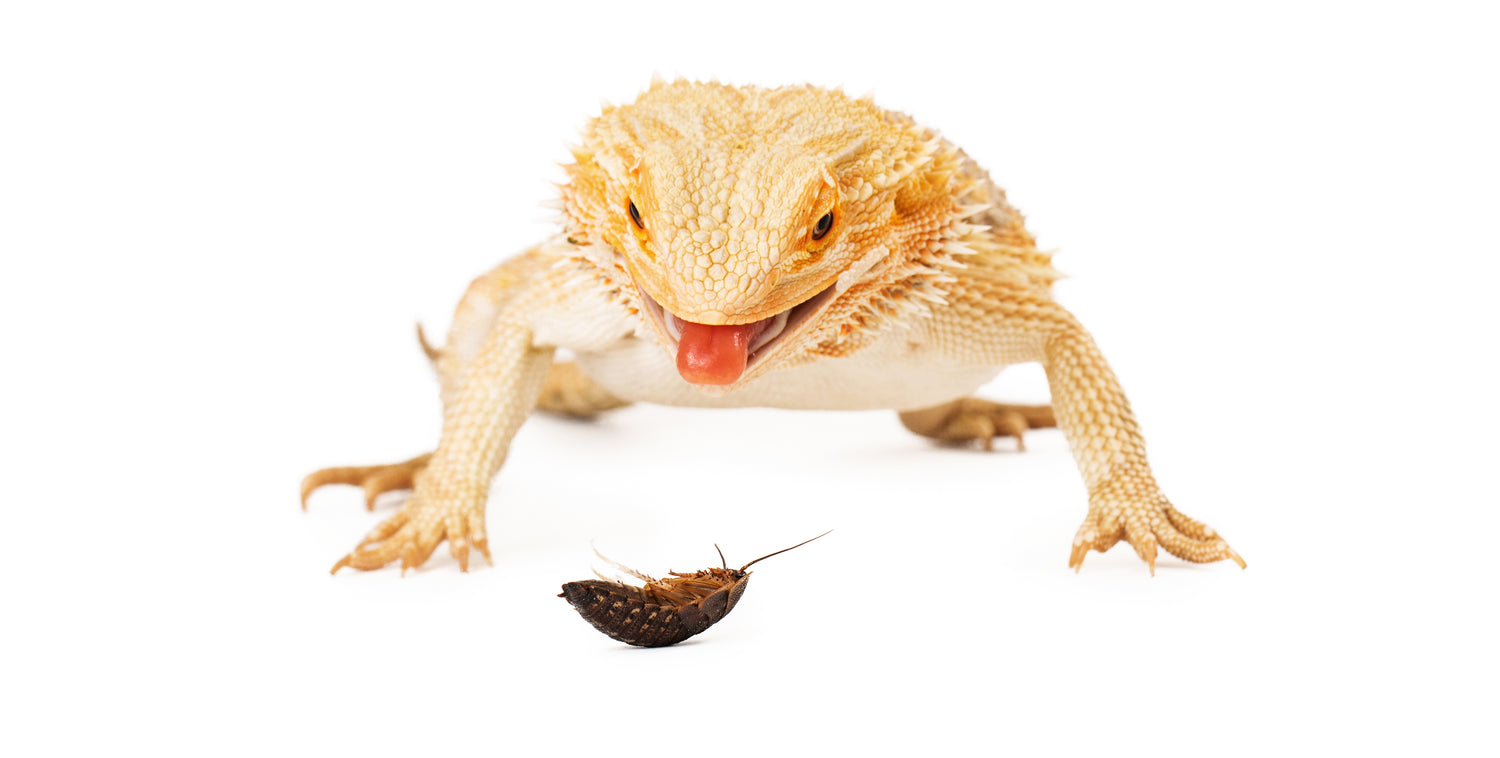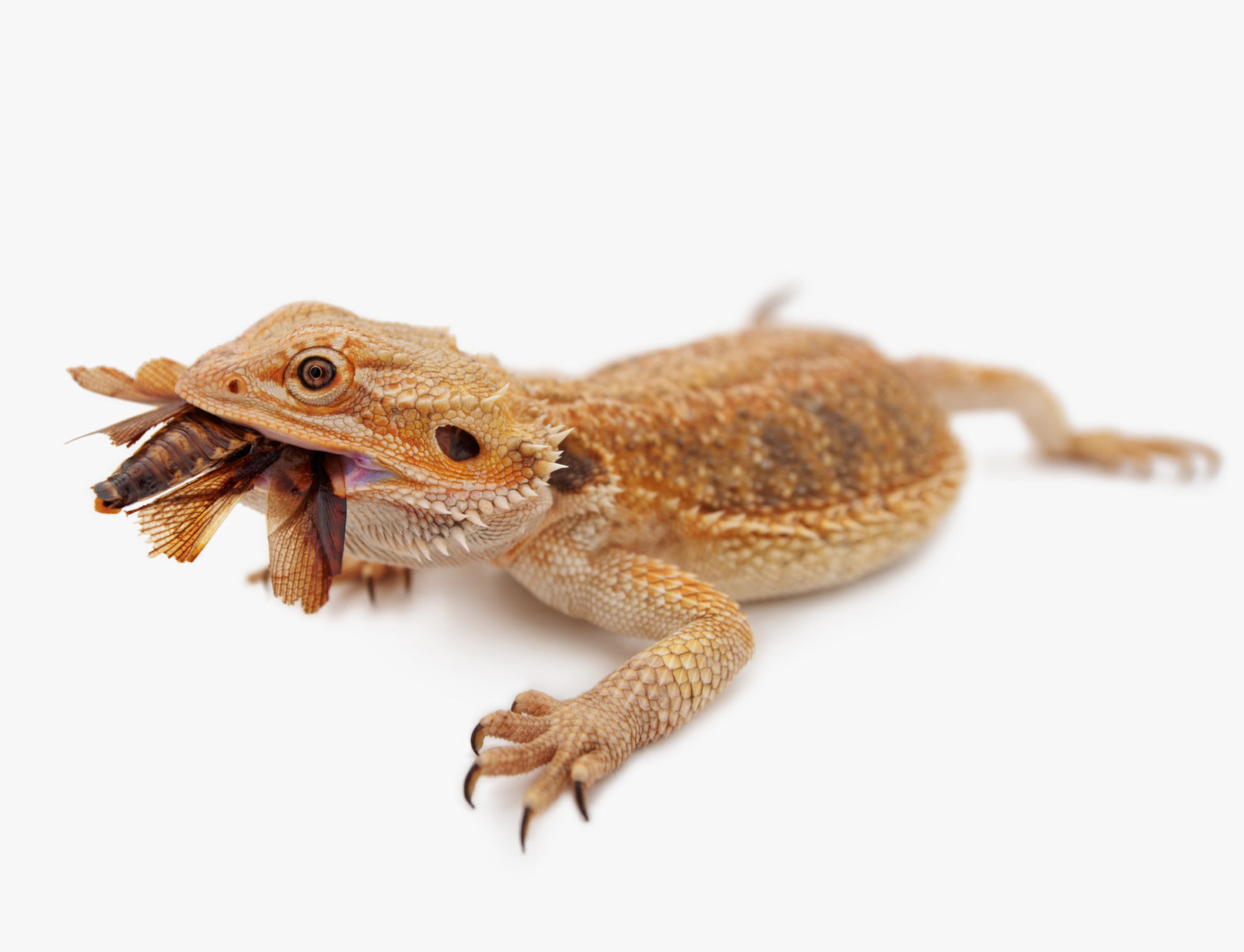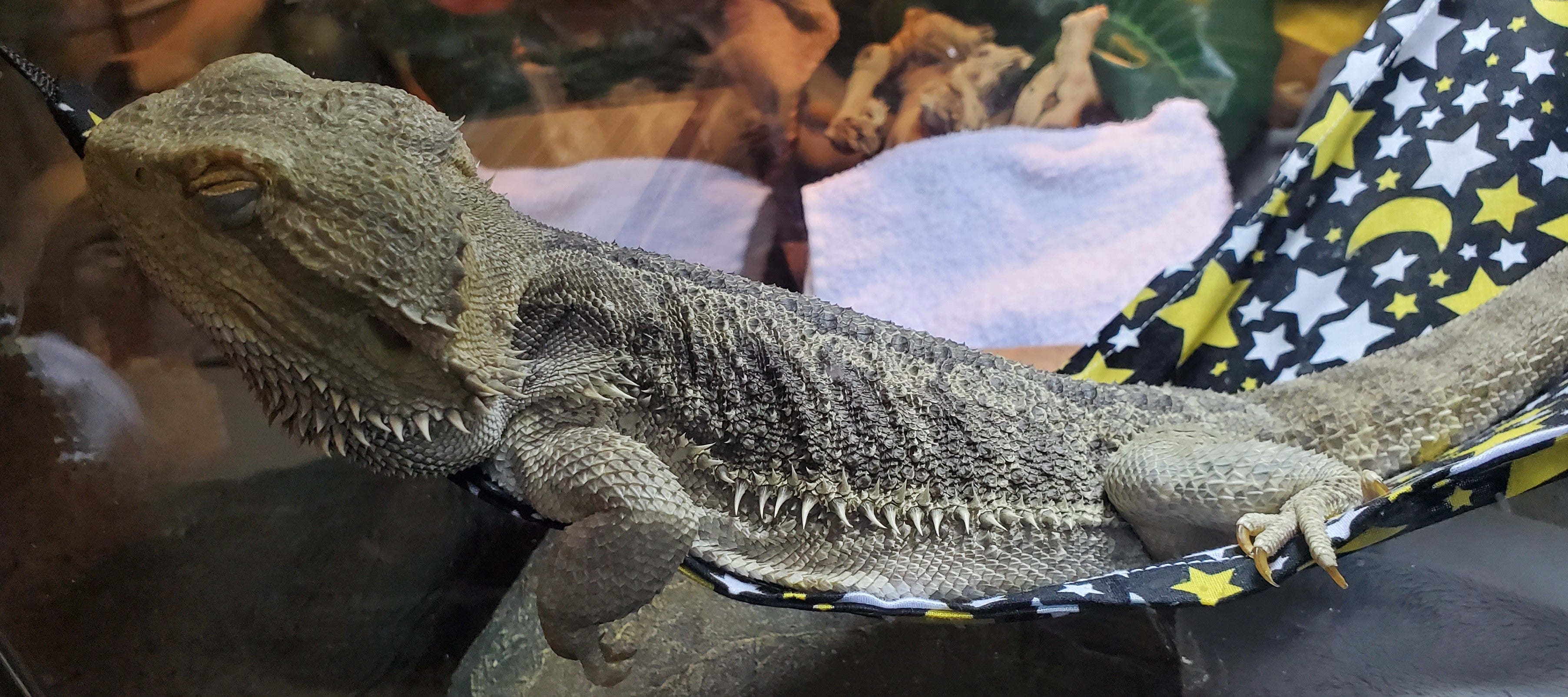There are many different things to consider when selecting the best diet for your dragon's long term health and wellbeing. The different nutritional elements that make up the various options each play a crucial role in helping your dragon thrive.
As well as the vitamins and minerals that are very important, you also have to consider other factors such as calcium and protein and how much of each goes to make up the various feeders on offer.
Although you do want to mimic the diet which Bearded Dragon's can have in the wild, we also have to take into account the fact that they aren't in the wild but captivity and their environment is different; they should never eat wild-caught bugs that you find as these can contain diseases and parasites that can hurt your dragon.
See below for more detailed information on insects for your pet Bearded Dragon.
Dubia Roaches
You will usually find Dubia Roaches first on the list for staple insects when it comes to Bearded Dragons; this is because they are an excellent source of protein, have a low-fat content, and also have a balanced range of nutrients. Not only this, but they also have several other benefits that you will not find when it comes to some other feeders.See below for some benefits of Dubia Roaches:
-
Less to no noise, Dubia are very quiet, especially when compared with crickets.
- Little to no smell, Dubia don't smell when appropriately kept, crickets have a strong unpleasant smell compared with Dubia.
- They breed easily; you will often find that your Dubia breed on their own without you even trying, giving you some extra bugs to feed your dragon.
- Cannot climb or fly, Dubia cannot climb smooth surfaces like the walls of a plastic tote or cricket keeper.
- Easily kept and maintained, you will find it easy to keep your Dubia alive, all you need is something for them to hide in such as egg crates and something to feed them such as leftover salad from your dragon's salad to keep them alive and gut-loaded.
Nutritional content of Dubia Roaches:
Extra small Dubia Roaches:
Moisture: 71.5%
Protein: 21.4%
Fat: 3.1%
Ash: 1.3%
Fiber: 2.6%
Calcium: 700 mg/kg
Phosphorous: 2600 mg/kg
Extra-large Dubia Roaches:
Moisture: 65.6%
Protein: 23.4%
Fat: 7.2%
Ash: 1.2%
Fiber: 2.9%
Calcium: 800 mg/kg
Phosphorous: 2600 mg/kg
Goliath Worms (Horned/Horn Worms)
Goliath Worms or Hornworms are another insect feeder for your Bearded Dragon, and they can be fed as a staple as they are a great source of nutrition. But should not be fed as a sole staple due to their high moisture content, they are best fed alongside another staple such as Dubia Roaches.
One of the more prominent features of these worms is that they grow extremely fast and can grow up to four or five inches in length. Even when purchased small to start with, given the right conditions, they can grow to full size within a matter of days, so depending on the size of your dragon, you may need to feed them off quickly. They are also commonly used to boost hydration when required due to their high moisture content, but be careful because this can result in a runny stool if fed too much.
Nutritional information for Goliath Worms:
Moisture: 85%
Protein: 9%
Fat: 3.07%
Ash: n/a
Fiber: n/a
Calcium: 464 mg/kg
Phosphorous: 1394 mg/kg
Waxworms
Waxworms are another staple insect that you can feed your bearded dragon; they are known as having a high-fat content so they should not be fed as the sole staple but alongside a less fatty staple such as Dubia Roaches. If your dragon has a weight problem, then these should be avoided.
If you feed too many of these to your dragon that can suffer from obesity and other related issues, you shouldn't feed any more than 2-3 per day in a mixture of other bugs to keep your dragon healthy.
You can buy wax worms pretty easily anywhere that sells feeders for reptiles, most pet stores stock them, and they are readily available at online retailers. They are pretty easy to keep as you can just store them in the container they arrive in.
Nutritional information for Waxworms:
Moisture: 58.5%
Protein: 14.1%
Fat: 24.9%
Ash: 0.6%
Fiber: 3.4%
Calcium: 243 mg/kg
Phosphorous: 1650 mg/kg
Superworms
Superworms are a great feeder insect; they are best fed along with another staple feeder as they have a slightly high-fat content. Your dragon can have ten of these per day with no problem when fed alongside another less fatty staple such as Dubia Roaches.Superworms are sometimes mistaken for giant mealworms but are, in fact, different, as well as being nutritionally better than mealworms. They also have a softer outer shell, known as chitin (pronounced ky-tin), which makes them easier to digest. Due to this, superworms can be fed to any age dragon as long as they are size appropriate.
Nutritional information for superworms:
Moisture: 57.9%
Protein: 19.7%
Fat: 17.7%
Ash: 1.0%
Fiber: 2.7%
Calcium: 177 mg/kg
Phosphorous: 2370 mg/kg
Mealworms
Mealworms are another popular feeder insect for Bearded Dragons, their size varies, but they can grow up to around two inches in length. They contain a hard outer layer, which is referred to as chitin (pronounced ky-tin). This is why some people advise not to feed them to dragons as they can have a hard time digesting them; this is particularly true for young dragons.
Mealworms should only be fed as part of a varied diet. For an adult dragon no more than five to six mealworms per day at the most, they should be avoided for younger dragons.
Nutritional information for Mealworms:
Moisture: 61.9%
Protein: 18.7%
Fat: 13.4%
Ash: 0.9%
Fiber: 2.5%
Calcium: 169 mg/kg
Phosphorous: 2950 mg/kg
Crickets
Crickets are a very popular feeder insect for Bearded Dragons, nutritionally they offer a good amount of protein and calcium, and they are widely available at pet stores and online retailers. You should not purchase them from bait shops as they tend to carry more parasites and diseases.
Some of their body parts can be hard to digest for dragons, such as their hind legs, so ensure adequate hydration when feeding them.
The negative thing about crickets is that they are notoriously hard to keep, they try and jump out of any container that you keep them in, they are noisy, they can smell very bad, and they can die very easily. They are also more likely to be carriers of parasites than other feeders like Dubia Roaches. If you are feeding crickets, you want to ensure that you are getting your Bearded Dragon a regular fecal exam every 6 months unless there are signs of parasites such as lethargy or loss of appetite. At this point, a fecal exam should be sought immediately.
Nutritional information for crickets:
Moisture: 77.1%
Protein: 15.4%
Fat: 3.3%
Ash: 1.1%
Fiber: 2.2%
Calcium: 275 mg/kg
Phosphorous: 2520 mg/kg
Black Soldier Fly Larvae (Nutrigrubs)
Black Soldier Fly Larvae are an excellent feeder insect for your Bearded Dragon, they have a lot of calcium and also a lot of protein, but they are known for their high calcium content. They make a good supplement for any dragon in need of calcium and can even take the place of a powder calcium supplement, but not one that contains D3.
They are best used for young dragons due to their very small size, they can be troublesome as a main staple insect as their small size doesn't always pique the interest of an adult dragon, and the quantities you would need to feed them can be impractical. They are easy to keep as they can be kept in the container they came in and don't need feeding.
Nutritional information for Black Soldier Fly Larvae:
Moisture: 61.2%
Protein: 17.5%
Fat: 14%
Ash: 3.5%
Fiber: 3%
Calcium: 9340 mg/kg
Phosphorous: 3560 mg/kg
Butterworms
Butterworms are another worm type feeder insect, similar looking to Black Soldier Fly Larvae but bigger. They also offer high levels of protein and calcium.
These make a good feeder because, due to their size, dragons will be more tempted to eat them.
Nutritional information for Butterworms:
Moisture: 60.2%
Protein: 15.5%
Fat: 29.4%
Ash: 0.8%
Fiber: 1.4%
Calcium: 125 mg/kg
Phosphorous: 2250 mg/kg
Silkworms
Silkworms are another feeder insect available for Bearded Dragons, but these aren't 'very widely used. They offer an okay amount of calcium but are low in protein for your dragon and are soft-bodied so easy for them to digest.
They can be difficult to find most of the time and are also expensive when you can find them, making them impractical to use as an everyday staple for your dragon.
Nutritional information for silkworms:
Moisture: 82.7%
Protein: 9.3%
Fat: 1.1%
Ash: 1.1%
Fiber: 1.1 %
Calcium: 177 mg/kg
Phosphorous: 2370 mg/kg




8 comments
Reptile Supply
Hi Luke — Options for alternative feeders are already detailed in this article. I believe discoid roaches have become available in Canada. I would look into a rotation of hornworms, silkworms, mealworms, and superworms for variety. Canned equivalents usually work in a pinch.
Luke Lalonde
I will be getting an adult bearded dragon I don’t mind worms but I’m not the biggest fan of crickets I also live in Canada meaning I can’t buy Dubai roaches do you have any worms or other bugs I could use as a staple feeder for him.
Reptile Supply
Hi Donna — It’s impossible to say exactly what you’re dealing with without having a visual of the situation, but it sounds like you may have gotten a fruit fly culture instead of a springtail culture, as springtails definitely do not have wings. It’s annoying, but the fruit flies should die out on their own. If there is no reptile yet in the enclosure, fly tape can help get the flies under control faster.
Donna Varela
I recently purchased some Springtails for my bioactive tank. Being new to the bioactive world when I put them in the tank they started climbing all over everything. Even up the walls of the inclosure like an infestation. After looking at them closer they have wings and Springtails don’t have wings. Did the store give me the wrong culture? These things are everywhere in 2 tanks. How do I get rid of them without ruining all the money I spent on the soil and products I purchased?? I’m positive these are not Springtails.
Kaylee
My bearded dragon has stoped eating roaches and crickets , but will still eat meal worms and her salad ! What do I do to get her to eat the roaches or crickets.
Leave a comment
All comments are moderated before being published.
This site is protected by hCaptcha and the hCaptcha Privacy Policy and Terms of Service apply.